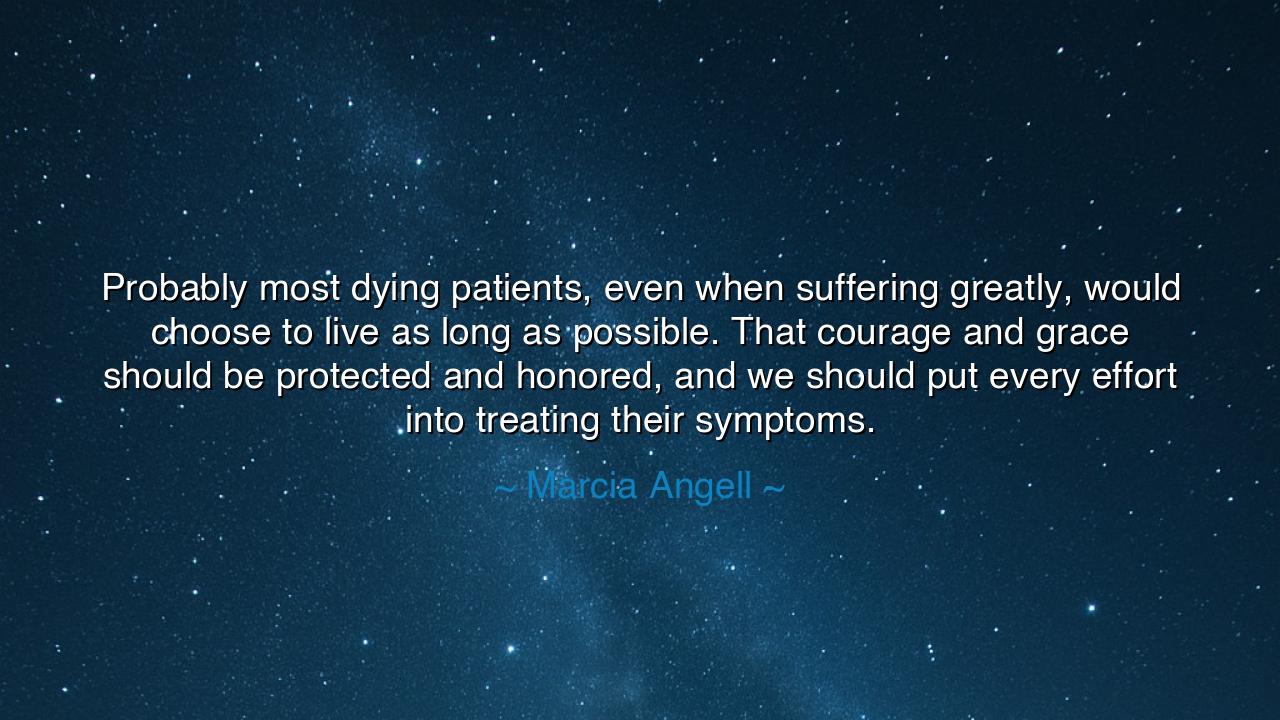
Probably most dying patients, even when suffering greatly, would
Probably most dying patients, even when suffering greatly, would choose to live as long as possible. That courage and grace should be protected and honored, and we should put every effort into treating their symptoms.






In the twilight between life and death, when breath comes as a whisper and the flame of the spirit flickers in the wind, the physician Marcia Angell spoke words of profound mercy: “Probably most dying patients, even when suffering greatly, would choose to live as long as possible. That courage and grace should be protected and honored, and we should put every effort into treating their symptoms.” In these words lives not only a physician’s wisdom, but a timeless call to compassion—a reminder that even as bodies fail, the will to live is an act of sacred defiance, and that to care for the suffering is to honor the deepest dignity of the human soul.
For when a person stands before the abyss, their choice to live—despite agony, despite fear—is not weakness but courage. It is the courage of the heart that says, “I will remain.” This, Angell teaches, must not be pitied nor hastened away, but protected and honored. The grace of those who endure should move us not to judgment but to reverence. For in their endurance shines the most ancient truth: that life, even in its final moments, carries meaning, and that to comfort the dying is to join in the sacred duty of preserving human dignity.
Think of the story of Sir William Osler, the great physician of the nineteenth century. In his final years, as illness consumed his body, he faced pain with serenity and gentleness. His students, watching him fade, saw no fear, only patience. Osler taught until the end that medicine is not merely the art of curing but the art of caring—of easing suffering when cure is no longer possible. His life embodied the truth Angell proclaimed: that when death cannot be denied, compassion must become our highest form of service.
And yet, how often does the world forget this sacred calling? In an age that worships speed and efficiency, many turn away from the dying, as if their fragility were a mirror too painful to behold. But to turn away is to betray our shared humanity. The dying do not ask us for miracles—they ask for presence, for relief, for the quiet assurance that their suffering matters. When Angell calls us to “put every effort into treating their symptoms,” she commands us to act not out of pity, but out of honor—to stand beside those whose battle is nearly done, and to bear witness to their strength.
In the hospitals and hospices of the world, this truth unfolds daily. The nurse who moistens a dry mouth, the doctor who lingers at the bedside to listen, the family member who holds a trembling hand—all become guardians of that grace Angell speaks of. In such moments, humanity reaches its noblest form. For it is not grandeur nor conquest that makes a life sacred, but tenderness in the face of the inevitable.
Courage and grace—these are the twin flames that burn even in the shadow of death. The dying remind us that life’s worth is not measured by its length but by its depth, not by how loudly we live but by how faithfully we love until the last breath. Their example teaches the living to cherish every dawn, to speak kindness, to forgive swiftly, and to give comfort where it is needed most.
Let this be the teaching for those who walk after us: do not flee from suffering, but meet it with compassion. Honor the will to live, even when life wanes. Tend to pain with patience, and treat the dying not as burdens but as sacred souls completing their final pilgrimage. To protect their courage is to affirm our own humanity.
Therefore, in your days of strength, remember the lesson of Marcia Angell’s words. When you encounter one who suffers, do not ask, “Why prolong their life?” but rather, “How can I ease their pain?” Sit beside them. Listen. Bring warmth, not pity; presence, not avoidance. For in that act, you become a healer of the spirit—and in doing so, you too will find the quiet grace that dwells at the heart of all true compassion.






AAdministratorAdministrator
Welcome, honored guests. Please leave a comment, we will respond soon